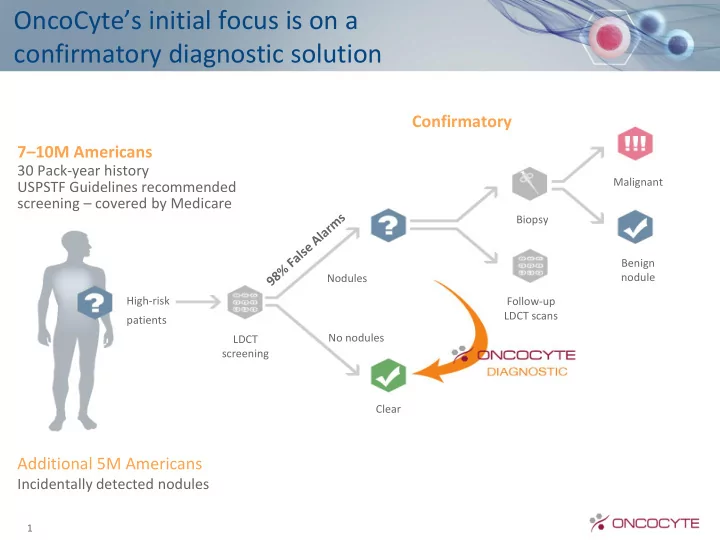

OncoCyte’s initial focus is on a confirmatory diagnostic solution Confirmatory 7 – 10M Americans 30 Pack-year history Malignant USPSTF Guidelines recommended screening – covered by Medicare Biopsy Benign Nodules nodule High-risk Follow-up LDCT scans patients No nodules LDCT screening Clear Additional 5M Americans Incidentally detected nodules 1
OncoCyte’s preliminary test shows strong performance • Prototype classifier presented at 2015 ATS annual meeting • Sensitivity: 76%; Specificity: 88% • Proof of concept for confirmatory, screening diagnostic • Bioinformatics lab of Dr. Louise C. Showe • 9+ years developing blood- based tests for lung cancer • Significant sample set (3,000 samples and ongoing collection) • OncoCyte exclusive global licensing agreement 2
Wistar validation shows strong results • Validated results of earlier study with comparable findings • Large sample (n=610) analysis, biomarkers only 100 Gene Model • Sensitivity 90%; Specificity 62% • Results suggest commercially attractive diagnostic NEXT STEPS • OncoCyte internal cross-validation study underway • Results anticipated March 2017 • Poster discussion session at May 2017 ATS annual meeting 3
Breast confirmatory diagnostic second product focus due to high unmet need Follow-up MRI Two potential intended use profiles • Confirmatory for suspicious mammograms • Adjunct for high-risk patients 4
Compelling proof of concept presented at 2016 San Antonio Breast Cancer Symposium Serum Biomarker Assay Research Serum SomaScan Biomarker Samples 1.3K Identification Screen 1,310 protein analytes Patients undergoing biopsy Analysis and algorithm in multiplexed format development 15-Marker Model: AUC = 0.92 • Serum samples from 100 women Sensitivity = 90%, Specificity = 76% with suspicious imaging results • Pathology confirmed benign (50) and malignant (50) • Malignancy detected in Stages I and II at 90% sensitivity, 76% specificity • Proof of concept for non-invasive blood test which could help to avoid unnecessary biopsies • OncoCyte is undertaking 300 patient study to confirm initial results 5
Recommend
More recommend